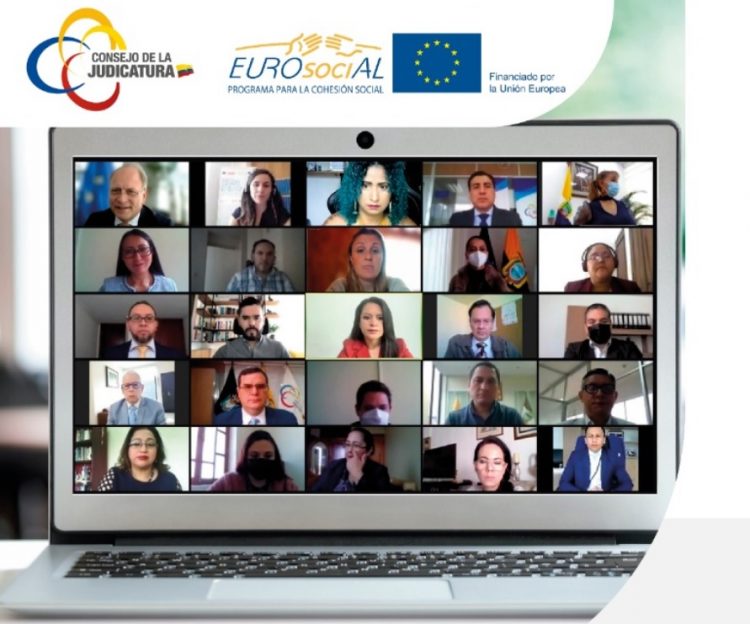The Council of the Judiciary in Ecuador and the EU-EUROsociAL+ Programme, through its Gender Equality Policies Department and coordinated by Expertise France, facilitate exchanging experiences on online trials in cases of gender violence.

Photo: Council of the Judiciary
The exchange webinar “European Union – Latin America: Online Trials in Cases of Violence” organised by the Ecuadorian Council of the Judiciary (CJ) and the EU Programme for Social Cohesion in Latin America (EUROsociAL+), resulting from a study to analyse promising practices in the implementation of lawsuits of this nature, fostered a space for dialogue on the practices of imparting justice in cases of gender-based violence in the context of the Covid-19 health crisis.
In the opening presentation, CJ President, María del Carmen Maldonado, presented Ecuador’s experience in implementing the virtual module of protection measures within the framework of the National Protection Measures System. The president reaffirmed that the Judicial Powers should promote access to justice especially for vulnerable groups, specifically women, girls and adolescents who are victims of violence that has become exacerbated in the context of the Covid-19 pandemic.
“Gender-based violence has very serious consequences for both physical, economic and political autonomy, and generates negative impacts on the entire society and its ability to contribute to sustainable development. For this reason, we highlight the commitment of the Council of the Judiciary in Ecuador to gender issues and access to justice with new digital responses through our EUROsociAL+ programme”, said the European Union Ambassador to Ecuador Charles-Michel Geurts.
According to a study on the perception of Gender Violence during the Covid-19 lockdown in Ecuador, more than 50% of women said they felt unsafe at home. In this context, the work of the CJ, in compliance with the fourth institutional axis of action on the eradication of violence against women, has been strengthened with investigation and action mechanisms, said María del Carmen Maldonado.
Referring to the Judicial Procedures System (Satje), the authority indicated that this system benefited more than 56,000 victims and complainants. She explained that “between January 2020 and July 2021 we protected about 3,000 women by issuing protection measures through a virtual module.”
In addition, within the framework of the Day for the Eradication of Violence against Women, on 26 November 2020, the Plenary of the CJ issued a resolution to monitor compliance with processes in cases of femicides and violent deaths. “Justice is a State obligation and that is how we conceive it, so we are vigilant”, she said.
Previously, in his opening remarks at the international meeting, Charles-Michel Geurts pointed out that the region faces one of the most critical moments in terms of rates of gender violence, exacerbated by the Covid-19 health crisis.
The event featured a presentation by magistrates from the judicial powers of Spain, Chile and the Dominican Republic, along with investigators from Argentina and Mexico, from the Justice Studies Center of the Americas and the EUROsociAL+ Programme, respectively.
Source: Council of the Judiciary, Ecuador



